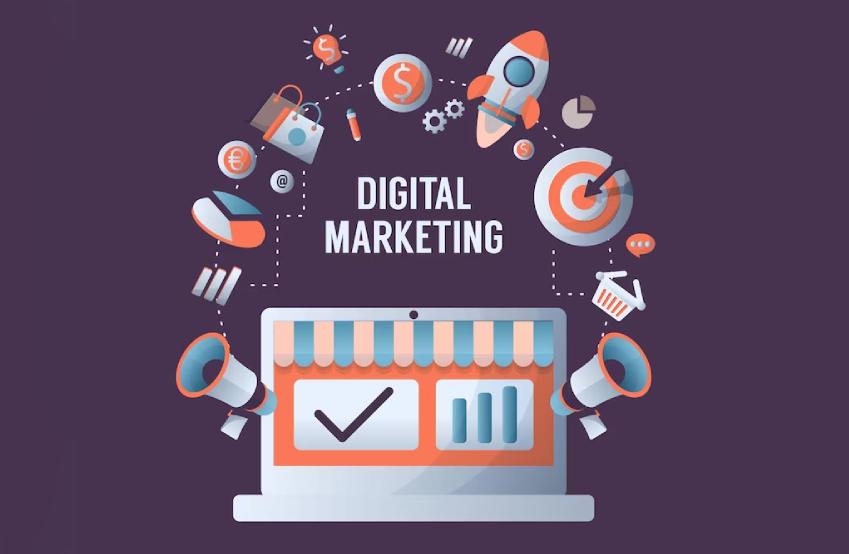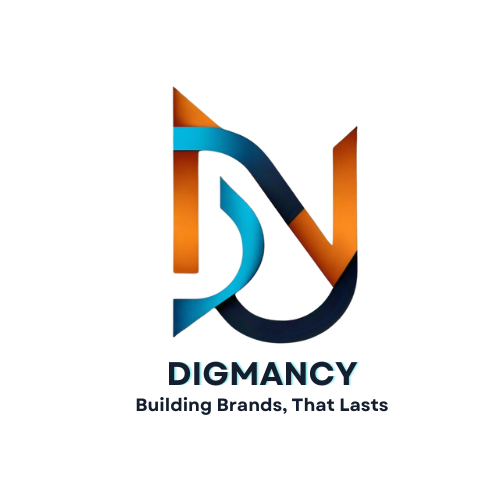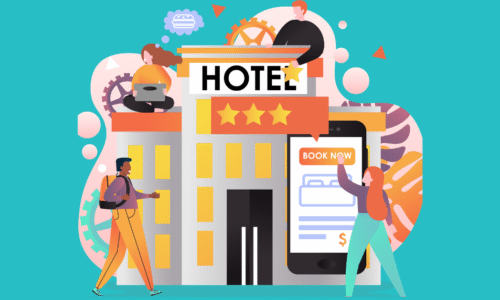
How AI is Revolutionizing Travel and Hospitality Marketing Today
Artificial Intelligence (AI) is revolutionizing every sector it invades, including travel and hospitality marketing. At this point in May 2025, modern-day AI is changing everything, from how established travel and hospitality organizations attract customers and engage with them to how best to inspire customer loyalty and product affinity. In this blog, we will look specifically at how AI is reshaping travel and hospitality marketing now, the trends we recognize, the pain points addressed by AI-engineered marketing, and how your business can benefit from our takeaways. After this review of AI in travel and hospitality marketing, we will showcase our digital marketing agency, Digmancy – a trusted choice for your travel and hospitality brand to access next-level AI-based marketing.
How AI is Revolutionizing Travel and Hospitality Marketing Today
The travel and hospitality sector is inherently customer-centric, and AI’s capabilities align perfectly with this focus by enabling hyper-personalized, efficient, and scalable marketing solutions. Here’s how AI is making an impact:
1. Unprecedented Personalization That Converts
Today’s travelers expect personalized experiences for vacations with their family, luxury getaways, and business trips alike. Powered by AI, travel and hospitality brands can go beyond standard ads to deliver personalized campaigns built on rich data regarding every detail of a user’s behaviors, preferences, booking patterns, etc. Predictive analytics provide an opportunity to anticipate the needs of each traveler, so businesses can offer personalized promotions, create custom packages, and provide relevant recommendations needed to drive an increase in conversions and brand loyalty.
2. AI-Powered Content Creation and SEO
Effective content is essential for marketing, and artificial intelligence tools, such as generative AI models, have become a must-have. AI tools can quickly produce exciting blog posts, social media posts, and ads enhanced with trending and impactful keywords relevant to travel and hospitality marketing. There are AI-driven SEO platforms monitoring search intent, as well as current SEO algorithm changes to keep travel websites in a top-ranking position to capture more organic traffic from search engines.
3. Enhanced Customer Service with Chatbots and Virtual Assistants
Travelling and hospitality companies are taking advantage of AI chatbots and virtual assistants to provide 24/7 assistance with booking assistance, frequently asked questions, personalized travel advice, and real-time problem-solving. This not only enhances guest satisfaction by providing rapid responses but also decreases operational costs by automating everyday inquiries.
4. Streamlining Operations and Optimizing Revenue
AI also drives operation efficiency across the travel and hospitality industries, starting from dynamic room pricing offered in relation to market demand and predictive maintenance in the airline sector to energy management in hotels, to more effective use of resources through improved business administration tasks. Resource optimization allows businesses the ability to reduce costs while enhancing a customer experience.
5. Hyperlocal and Contextual Targeting
As location-based technologies advance and AI can assess a variety of contextual information (weather, language use, a local festival), marketers can launch hyperlocal campaigns that engage travelers in their immediate surroundings. This increases engagement and ultimately leads to direct bookings in competitive destinations.
Pain Points AI Addresses in Travel and Hospitality Marketing
Travel and hospitality businesses face unique challenges that AI is helping to solve:
- Customer data has been fractured into different channels of marketing, which often obscures our message—AI platforms can combine data, offer insight, and help us deliver a unified message across varios marketing channels.
- High marketing cost with unclear ROI—AI assists in creating a finer customer target audience and allows us to pivot our campaign activity in real-time and earn a better ROI.
- Inability to respond rapidly to fast changing market conditions—AI has the functional ability to make decisions to pivot campaigns, offers, and pricing on the spot.
- Limited ability to personalize the service at scale—AI-driven automation and personalization tools can offer a unique experience to guests without the manual labor.
- Heavy reliance on third-party platforms (OTAs)—AI-driven direct booking solutions offer lower commission fees and the build brand-consumer relationships.

Trending AI Innovations from Google and Industry Leaders
Google has recently made strides with artificial intelligence in the areas of generative AI, multimodal (text, images, and speech integrated), and intelligent AI agents (chatbots that are evolving to behave and operate as autonomous partners that manage human-level campaigns and customer interactions). Put simply, this will enable smarter content generation, optimization for voice search, and highly responsive advertising that adapts to each source’s specific interests in real time.
FAQs About AI in Travel and Hospitality Marketing
Q1: When can travel-related businesses expect to see a return on their investments in AI marketing?
A: Most companies see a fairly significant impact within the first few months, especially around personalization of ads, dynamic pricing options, and using chatbots to reduce `personnel overheads`.
Q2: Is AI marketing expensive to set up for smaller travel agencies or hotels?
A: There are more AI solutions that are available, and these will only expand and improve. Many have made text message or chatbot support packages designed for smaller businesses.
Q3: Will AI displace human marketers for travel or hospitality?
A: AI is not a standalone solution, but it does supercharge human creativity and strategies. However, it does not replace humans’ ability to apply judgment to complex contextualized situations, nor does it emulate human emotional intelligence in the marketing sector.
Q4: In what ways does AI enhance the customer experience in hotels?
A: AI enhances user experiences by offering personalized suggestions, smart room control through voice, unlimited support, and personalized communication before, during, and after stays.
Q5: In AI marketing for travel, what relationship is there to data privacy?
A: Ethical AI marketing observes data regulations and leverages anonymized data, which marketers utilize to provide experiential personalization while keeping users’ data safe.
How Digmancy Can Help Your Travel and Hospitality Business Harness AI
Digmancy, a digital marketing agency, is leading the emerging field of AI-assisted travel and hospitality marketing. With their holistic and data-driven approach, here’s how Digmancy launches your marketing plan:
- AI-optimized website construction – Create fast, SEO, mobile-friendly websites designed to convert website visitors to direct bookings without relying on OTAs.
- Custom SEO and content marketing – Target high-value keywords with AI and improve content with relevancy and creativity by using its insights to build on and scale your presence, enabling more visibility in search engine searches/organics.
- Social media marketing “AI Style” – Engage travelers with stunning visuals, compelling ad campaigns, and video content to elevate audience engagement with AI optimized ads and campaigns.
- PPC or programmatic advertising “AI Style” – Gain more, instant bookings with precise targeting via Google and Facebook Ads, all enhanced with AI to manage bid strategy and retargeting.
- Data analytics and personalizing your marketing campaigns – Utilize AI tools to help analyze guest data, prediction, and campaign development to increase personalisation feel and customer satisfaction, ultimately gain loyalty and repeat visits for your travel and hospitality company/brand.
- Overall digital strategy – Hyper-local targeting to omnichannel campaigns and Digmancy systems ensure your travel and hospitality branding stays in the forefront of a saturated and competitive market.
Digmancy’s proven track record of helping over 50 hotels and resorts, doubling revenue streams, and allowing travel and hospitality brands to feel at ease when it comes to AI marketing lets travel and hospitality companies continue to evolve predictably, sustainably, and intentionally with AI.
Conclusion
To summarize, AI is not merely a forward-looking idea but a leading-edge revolution in the present for travel and hospitality marketing. AI will allow brands to personalize customers through hyper-personalization, provide operational efficiencies and speed, and respond quickly to swinging market conditions and demand in a cost-effective way. If you can leverage AI in your favor and deploy AI used by experts like Digmancy, your traditional pain points will evaporate and new revenue opportunities will emerge. Working with experts like Digmancy is important to help you utilize AI strategically so your travel or hospitality business will achieve outstanding results in 2025 and beyond. The future of travel and hospitality marketing will be intelligent, personalized, and AI-driven.
The full application of AI in travel and hospitality marketing—using high-priority keywords and fundamentally addressing real problems—should help you achieve a top ranking position in search engines, attract your chosen audience, and then convert clicks into repeat customers. Begin today with AI and help your travel and hospitality brand take-off!



